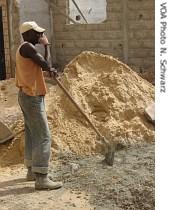-
(单词翻译:双击或拖选)
By Naomi Schwarz
Dakar
19 October 2006
Senegal has made headlines as a departure point for people desperate to emigrate to Europe and the United States. But for many West Africans, Senegal, and particularly its capital, Dakar, is a destination in itself.
---
The small gravel1 courtyard in front of Muhammed Serif Diallo's house is full of friends watching the Chelsea-Barcelona soccer match on TV. He, like his uncle sitting in the back of the crowd, and several others there, is from Guinea.
But Senegal, not Guinea, is the location of the quiet road in which these men sit and cheer. They have all moved to Senegal's capital, Dakar, in the hopes of making a better living.
 Many immigrants to Dakar work in construction |
||
Guinea borders Senegal to the southeast. Like Senegal, it is a former French colony. But where Senegal has had democratic elections and peaceful transfers of power since independence, Guinea has suffered under repressive regimes and multiple coup2 attempts.
Economists3 estimate that in the past several years, Senegal's economy has grown by about six percent and has had less than two percent inflation. In contrast, Guinea's economy is estimated to have grown by a mere4 two percent, and inflation has spiraled to 30 percent or more.
Although Senegal is still a very poor country, it ranks 157th out of 177 countries on the United Nation's human development index, it is economically better off than many of its neighbors. At more than $650 a year, per capita income in Senegal is a third to two-thirds higher than those of neighboring Mauritania, Mali, Guinea, Guinea-Bissau, and The Gambia.
Demographers5 call the phenomenon "south-south migration6", meaning population movements from one developing country to another, and it happens throughout the developing world.
"The importance of south-south migration is underestimated," said Amand Rousselot is the West and Central Africa representative for the International Organization for Migration, a Geneva-based intergovernmental organization.
Unlike would-be immigrants to the United States or Europe, Mr. Rousselo explains, it is easy to move within West African countries. Thanks to a 1979 agreement, citizens from countries within ECOWAS, the Economic Organization of West African States, can move to any other ECOWAS country with nothing more than their identity card.
And with plenty of vehicles taking passengers overland, and a continuing nomadic7 tradition among many of the region's ethnic8 groups, lots of West Africans take advantage of the relaxed borders.
There are millions of foreigners living and working in countries like Senegal, Ivory Coast, and Ghana.
Rousselot says this could lead to tensions.
"The youth population in West Africa represents about 50-60 percent of the population," he added. "And the same percentage of youth is unemployed9. You can imagine that sooner or later this will generate some social conflicts because the nationals will want to work, and the work will be done by foreigners even if they are done by people from neighboring countries."
Muhammed Diallo, the Guinean who has lived in Dakar for more than 13 years, says he suspects that he is sometimes paid less than a Senegalese would be. And he has occasionally been told by Senegalese that Guineans should not be here. But, he is quick to note, other Senegalese defend Guineans, and above all, the Senegalese are the ones who give him work.
But finding work in Dakar was not easy. Eventually Diallo, like many foreigners in Dakar, began working in construction; he digs foundations. He now leads his own team of foundation diggers, with an ever-changing roster10 that consists primarily of other Guineans, most of whom come from his family or his hometown in central Guinea.
I try to give work to other Guineans, Diallo says, to help out my countrymen, because I know how hard it can be to find work.
When asked, Diallo agrees that he would still like to go to America or Europe, where, he imagines, he could make even more money. But, he says, he has not had the opportunity. Rather, he seems settled in Dakar. He has a Senegalese wife and two children, and a small house he built himself.
Back in Guinea, which, like Senegal, is a predominantly Muslim country where polygamy is legal, Diallo also has a second wife, and two children, and a house he built himself as well.
 收听单词发音
收听单词发音
1
gravel

|
|
| n.砂跞;砂砾层;结石 | |
参考例句: |
|
|
|
2
coup

|
|
| n.政变;突然而成功的行动 | |
参考例句: |
|
|
|
3
economists

|
|
| n.经济学家,经济专家( economist的名词复数 ) | |
参考例句: |
|
|
|
4
mere

|
|
| adj.纯粹的;仅仅,只不过 | |
参考例句: |
|
|
|
5
demographers

|
|
| n.人口统计学( demography的名词复数 ) | |
参考例句: |
|
|
|
6
migration

|
|
| n.迁移,移居,(鸟类等的)迁徙 | |
参考例句: |
|
|
|
7
nomadic

|
|
| adj.流浪的;游牧的 | |
参考例句: |
|
|
|
8
ethnic

|
|
| adj.人种的,种族的,异教徒的 | |
参考例句: |
|
|
|
9
unemployed

|
|
| adj.失业的,没有工作的;未动用的,闲置的 | |
参考例句: |
|
|
|
10
roster

|
|
| n.值勤表,花名册 | |
参考例句: |
|
|
|















